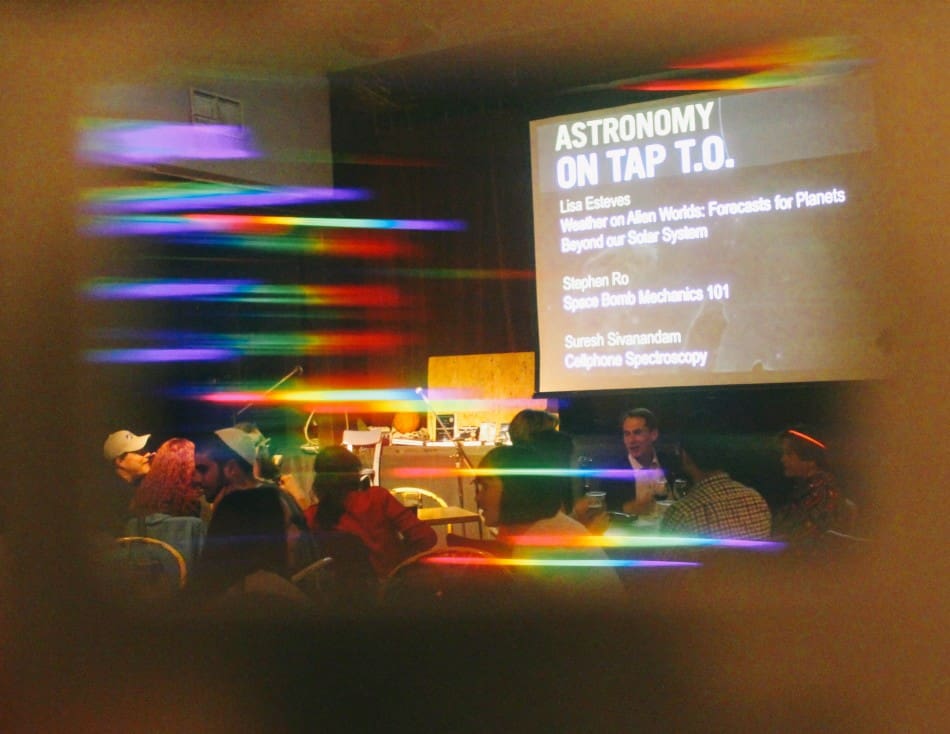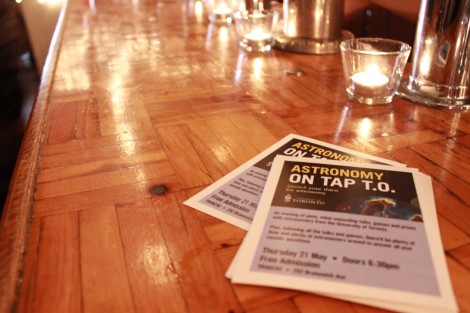“If you’re sitting in the front row tomorrow night, be warned: there will be bouncing balls and bullwhips, so hold onto your beer!” This was the warning posted by the Dunlap Institute for Astronomy and Astrophysics the night before their popular Astronomy on Tap T.O. talk, on the Facebook page for the event. As I found out the following evening, everything promised was more than delivered.
Astronomy on Tap is a space-themed pub event founded in New York City in 2013 by postdoctoral fellow in astronomy and astrophysics, Meg Schwamb. As of last year, members of the Dunlap institute at the University of Toronto have picked up on the science-and-beer buzz and have started Astronomy on Tap T.O.
Every couple of months, experts in all fields of astronomy, ranging from galaxy formation, to supernova explosions, to brand-new research in exoplanets (planets outside of the solar system), come together at different Toronto bars to discuss their research in a manner that is accessible and exciting for the general public.
Don’t imagine stuffy lectures and discussions full of scientific jargon, Astronomy on Tap T.O. is anything but.
I attended their fourth, and most recent event held last month at the Tranzac Club. By the time I arrived, the hall was already packed, mostly with people in their twenties and thirties. Although I spoke to many young professionals, there were also a number of U of T students in attendance.
“[It’s] nice [for] when you have a low-base of knowledge,” one man tells me, after explaining that although he had studied physics in the past, but he was not a student. His friend, who had no background in science at all, chips in with, “Stars and beer — why not!”
“This is geared towards the people with a casual interest [in astronomy]— people who haven’t taken astronomy classes,” explains Stephanie Keating, an astrophysics PhD candidate at the U of T, who is in her final year, and one of the co-organizers of the event.
“I feel like astronomy on tap was already the kind of thing that a lot of the people in the [astronomy and astrophysics] department already do, kind of with their friends,” Keating explains, “when you go to a bar, and you have to kind of explain your research and whatnot, so this is kind of making that more fun.”
The casual outing-with-friends atmosphere was definitely maintained at the event itself, only a lot larger and more organized. The evening opened with a 90 second recap of astronomy news, delivered by Chris Sasaki from the Dunlap Institute. This was followed by three ten-minute talks on specific research topics, delivered by members of the department of Astronomy and Astrophysics at the U of T. The talks were dispersed throughout the night, with pub-quiz style games for the audience, which included prizes, in between.
There was also plenty of time to grab drinks between the talks, and to ask questions or simply chat about space with the astronomy experts present. All of whom were decked out with glow sticks as a way to tell them apart from the rest of the crowd.
The basketballs and bullwhips made an appearance during the second talk, where the bounce of different types of balls and the cracks of different whips were used as an analogy to explain the mechanisms behind a supernova explosion. The other two talks described how to create a weather-report for exoplanets, and how to recognize different types of elements by creating specific light patterns, using nothing but a thin filament of plastic and your cell-phone camera.
Astronomy on Tap T.O. is both organized, and sponsored by The Dunlap Institute for Astronomy and Astrophysics, who, along with the Canadian Institue for Theoretical Astrophysics (CITA) and the Astronomy and Astrophysics Department at U of T supply the glow-stick bearing space experts present at the event.
According to Keating, they are aiming to hold between four to six events this year, one every couple of months. Keating is hoping to explore different venues and different neighbourhoods for Astronomy on Tap T.O. in the future.



